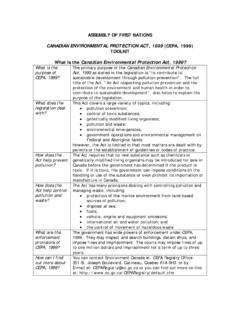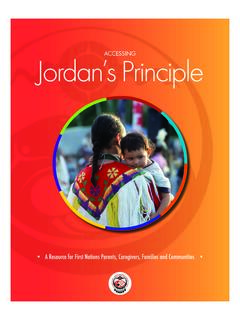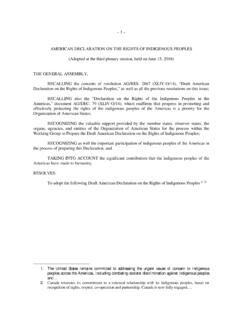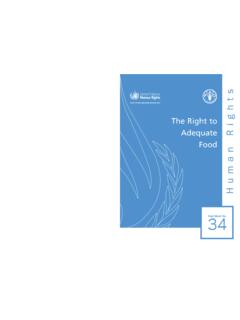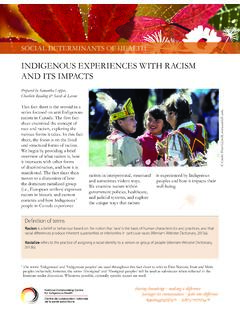Transcription of ASSEMBLY OF FIRST NATIONS Dismantling the Doctrine of ...
1 ASSEMBLY OF FIRST NATIONSD ismantling the Doctrine of DiscoveryJanuary all doctrines, policies and practices based on advocating superiority of peoples or individuals on the basis of national origin or racial, religious, ethnic or cultural differences are racist, scientifically false, legally invalid, morally condemnable and socially unjust ..UN Declaration on the rights of indigenous Peoples, preambular para. 4 Convinced that any Doctrine of superiority based on racial differentiation is scientifically false, morally condemnable, socially unjust and dangerous, and that there is no justification for racial discrimination, in theory or in practice, Convention on the Elimination of All Forms of Racial Discrimination, preambleAdvancing reconciliation requires bringing Canadian law and policy into line with international human rights law, which has condemned doctrines of superiority, including discovery and terra nullius, as colonial and racist.
2 Yet the racist assumptions and impacts of these doctrines live on in aspects of Canadian law and policy. They are evident in underlying assumptions that assume FIRST NATIONS are claimants in our own lands and that treat FIRST NATIONS as somehow lacking sovereignty. The assumptions and impacts of these racist doctrines must be uprooted. The path forward will require Canada to acknowledge the truth of our pre-existing and continuing sovereignty as self-determining Chief Perry BellegardeAssembly of FIRST NATIONS | Dismantling the Doctrine of discovery | January 2018- 2 -How is it possible that any Pope, King or Queen, or explorers from Europe could discover lands in the New World if indigenous Peoples were already occupying such lands, according to our own laws and legal orders?The Doctrine of discovery emanates from a series of Papal Bulls (formal statements from the Pope) and extensions, originating in the 1400s. discovery was used as legal and moral justification for colonial dispossession of sovereign indigenous NATIONS , including FIRST NATIONS in what is now Canada.
3 During the European Age of discovery , Christian explorers claimed lands for their monarchs who felt they could exploit the land, regardless of the original inhabitants. This was invalidly based on the presumed racial superiority of European Christian peoples and was used to dehumanize, exploit and subjugate indigenous Peoples and dispossess us of our most basic rights . This was the very foundation of Such ideology lead to practices that continue through modern-day laws and policies. The ASSEMBLY of FIRST NATIONS remains deeply concerned about the contemporary ramifications of the Doctrine of discovery and other discriminatory practices. Now is the time for Canada to finally and formally end any reliance on the Doctrine of discovery . The AFN recommends that Canada take the following steps: Acknowledge that this Doctrine has had and continues to have devastating consequences for indigenous peoples worldwide, including FIRST NATIONS in Canada; Reject doctrines of superiority as illegal and immoral, and affirm that they can never be a justification for the exploitation and subjugation of indigenous peoples and the violation of human rights ; In full partnership with FIRST NATIONS , examine how Canadian history, laws, practices and policies have relied on the Doctrine of discovery ; Repudiate all doctrines of superiority in a legislative framework for implementation of the united NATIONS Declaration on the Right of indigenous Peoples, developed together with indigenous peoples.
4 Reinterpret Canadian law in a manner consistent with the united NATIONS Declaration on the Right of indigenous Peoples and other contemporary international human rights standards; Ensure that the violation of FIRST NATIONS rights to lands, territories and resources that were taken without their free, prior, and informed consent are effectively redressed; and Ensure that the Doctrine is not in any manner invoked in contemporary court cases or BackgroundCases in Canada, such as St. Catherines Milling and Lumber Company v. The Queen, relied upon early Supreme Court cases such as Johnson v. McIntosh that are based on the discovery Doctrine . It is worth noting that in these and other relevant legal cases, the indigenous Peoples affected were not included as direct parties. Such breaches of natural justice serve to further discredit these rulings and the Doctrine on which they are based. discovery was used as a tool to attempt the exclusive power to extinguish indigenous rights on an ongoing The pre-existing inherent sovereignty of indigenous Peoples was not considered.
5 Scholar Robert J. Miller summarizes this history, the ongoing contemporary ramifications, and the urgency of addressing discovery : ASSEMBLY of FIRST NATIONS | Dismantling the Doctrine of discovery | January 2018- 3 -Europeans, and later the colonial countries, believed they possessed the only valid religions, civilizations, governments, laws, and cultures, and that Providence intended that their institutions should dominate indigenous peoples.. As a result, the governmental, property, and human rights of indigenous peoples were almost totally disregarded as discovery directed European colonial expansion. In modern times, these assumptions remain dangerous legal and historical common understanding and application of the international law of colonialism was and is potent and lethal to indigenous peoples and NATIONS . Correcting and erasing the vestiges of discovery from the modern-day laws and lives of settler societies .. is a task that must be undertaken and that must succeed if the legal and human rights of indigenous NATIONS and peoples are going to be honored around the world, and if indigenous peoples are going to have equal rights to court rulings continue to interpret the law relying on the Doctrine of discovery .
6 As recently as 2012, the BC Court of Appeal not only validated such destructive acts, but also attempted to extinguish indigenous rights through judicial ruling:European explorers considered that by virtue of the principle of discovery they were at liberty to claim territory in North America on behalf of their sovereigns .. While it is difficult to rationalize that view from a modern perspective, the history is Haida Nation, the Supreme Court of Canada confirmed: Canada s Aboriginal peoples were here when Europeans came, and were never conquered. 5 Under Canada s constitutional framework, Crown sovereignty and legislative power are not absolute. In Haida Nation, the Supreme Court highlighted: Treaties serve to reconcile pre-existing Aboriginal sovereignty with assumed Crown sovereignty .6 Yet such reconciliation has not taken Supreme Court has taken judicial notice of such matters as colonialism displacement and residential schools ,7 which demonstrate how assumed sovereign powers were abused throughout history.
7 The root cause of such abuse leads back to the Doctrine of discovery and other related fictitious constructs. These legal fictions must therefore be addressed. Tsilhqot in Nation Victory at Supreme Court of Canada Interveners in the landmark Tsilhqot in Nation case, dealing with indigenous Peoples title to land, called for the Supreme Court of Canada to formally repudiate the Doctrine of discovery : (Also the Hul qumi num Treaty Group intervention.) Finally, the principle of discovery cannot be relied upon in formulating an approach to Aboriginal title, and must be firmly rejected. The principle of discovery is a continuation of colonialism that amounts to a violation of the Charter of the united NATIONS .. and the principles of international law. 8 While the unanimous ruling did not name discovery directly, the Court did address the related Doctrine of terra nullius. In referring to the pre-existing land rights of indigenous Peoples, the Supreme Court ruled: The Doctrine of terra nullius (that no one owned the land prior to European assertion of sovereignty) never applied in Canada, as confirmed by the Royal Proclamation (1763).
8 9 ASSEMBLY of FIRST NATIONS | Dismantling the Doctrine of discovery | January 2018- 4 -This is because there are equitable principles10 in the Royal Proclamation that have applied throughout Canada since its creation and such principles preclude any unjust, discriminatory Just as the Supreme Court concluded that the Proclamation confirms that the Doctrine of terra nullius never applied in Canada, the same must be true in regard to the Doctrine of Both these doctrines are also inconsistent with the constitutional principle to uphold the honour of the Crown. It is the Crown s responsibility to demonstrate on what basis it can validly claim Crown sovereignty and where such sovereignty would apply. Such claims must be consistent with the UN Declaration on the rights of indigenous Peoples and other international human rights big question remains: how did the Crown obtain title and how does the Crown continue to assert sovereignty?
9 As scholar John Borrows reminds us, Canadian law will remain problematic for indigenous peoples as long as it continues to assume away the underlying title and overarching governance powers that FIRST NATIONS possess. 13 united NATIONS on DiscoveryMany human rights bodies within the UN system have strongly commended all racist doctrines of superiority. The united NATIONS Permanent Forum on indigenous Issues has extensively studied the issue of the Doctrine of discovery and the impact of indigenous Peoples. The Forum has produced two major studies on the topic. The FIRST study concluded: .. International human rights law .. demand (s) that States rectify past wrongs caused by such doctrines, including the violation of the land rights of indigenous peoples, through law and policy reform, restitution and other forms of redress for the violation of their land rights .. the Permanent Forum emphasized that redefining the relationship between indigenous peoples and the State as an important way to understand the Doctrine of discovery and a way to develop a vision of the future for reconciliation, peace and justice.
10 The Permanent Forum encourages the conduct of the processes of reconciliation in accordance with the principles of justice, democracy, and respect for human rights , equality, non-discrimination, good governance and good faith .14 The second united NATIONS study was completed by Grand Chief Edward His study went beyond the history, to deal with redress in a contemporary framework. His study illustrates the critical need to examine how Crown sovereignty and underlying title could ever have legitimately crystallized through the discovery of indigenous peoples lands and territories. The Doctrine must be unmasked so its manifestations are made visible. 16 Grand Chief John s study concluded:..fundamental changes must be reflected through constitutional and legislative reforms, policies, and government negotiation mandates in regard to indigenous peoples.. Decolonization processes must be devised in conjunction with indigenous peoples concerned and compatible with their perspectives and approaches.






